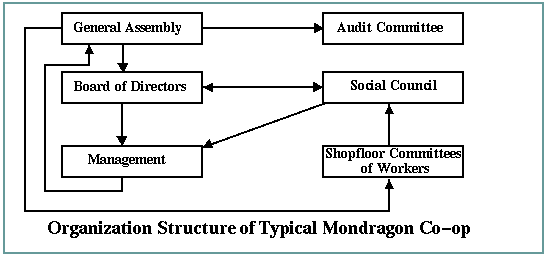| Father Jose Maria Arizmendiarrieta (Don Jose Maria) was assigned as a young Catholic priest to a small industrial town named Mondragon in the Baasque country of northern Spain in February 1941. One of his favorite phrases was "We build the road as we travel." He taught religion classes to the town's young workers, founded a soccer league, raised funds to start a small technical school, arranged for graduates to pursue college-level engineering degrees on an extension basis, and in 1956 five of his students formed a small manufacturing business as a cooperative. This small business has now grown into a complex of over 170 cooperative enterprises employing more than 23,000 workers. Revenues in 1990 were almost $3 billion. Exports make up roughly a third of revenues. Not only does it constitute the largest group of affiliated cooperative enterprises in the world, it is extremely successful in simple business terms. Research has shown that the enterprises of the Mondragon cooperative complex are more efficient, more profitable, better capitalized, and have grown faster than any comparable Spanish private firms. Retained earnings, levels of job creation, and productivity are also higher than in comparable Spanish private firms. Turnover and absenteeism are far lower than national or regional averages. And what is perhaps the most impressive feature of the Mondragon cooperatives is their record of no job loss in a weak economy. |
| The Mondragon enterprises are cooperative corporations owned by their employees. All employees are owners and nonemployees cannot be owners. They are governed on a one-person, one-vote basis. General assemblies of workers, like shareholders meetings, are held annually. Management is elected by the worker assembly and usually given a multiyear contract to promote long-range planning. In addition to the workers assemblies, social councils represent the workers in such matters as benefits, working conditions, and grievances. |
 General Assembly: ultimate source of authority and decision-making in the co-op; determines major policies regarding investments, finances; reviews annual budget, profit and loss statements, productivity levels, etc.; receives reports from Audit Committee; made up of all worker-owners; the Assembly elects memberws to the Board of Directors; meets at least annually. Board of Directors: develops implementation plans to carry out direction from the General Assembly; reports to the Assembly; top management attends as non-voting participants to hear concerns, responds to issues. Audit Committee: three person watchdog group to ensure that Management and Board are fiscally responsible, and that financial transactions are appropriate and legal; may draw from co-op bank staff or other outside experts as needed; areas of concern may be conveyed directly to the workforce, or a special meeting of the General Assembly may be announced. Management: team of top executives is appointed by the Board of Directors for a 3-4 year term; they are also members of the co-op; have administrative authority to operate day-to-day business actions such as purchasing, production, quality, accounting, marketing and so on, consistent with Board and General Assembly guidelines. Social Council: functions somewhat like a trade union, but is more collaborative than confrontational; made up of Shopfloor Committee worker representatives; meets monthly or quarterly to consider such issues as safety, personnel matters, working conditions and so forth; rather than filing grievances, council engages in joint problem-solving processes to improve the quality of work life. Shopfloor Committee: teams of workers in various areas of the factory which meet monthly to discuss their needs and concerns regarding working conditions, health and safety, schedulling, and proposals for improving the workplace; representatives are chosen to voice these issues at the next level up, an overall forum known as the Social Council. |
| "One becomes a cooperator through education and the practice of virtue. ... We need each other; we are called upon to complement each other. The man who can stand solitude is either a god or a beast, as a celebrated philosopher has stated. And this means that social classes need each other and should collaborate; this means that the people and the authorities must not live divorced from each other. This means that institutions must offer mutual aid, that we must sincerely pursue what we claim, that is the common good, there is no reason for exclusivity. ... For this purpose it is not enough that the bosses undertake and do good things. It is necessary that the workers participate in these things, so that a real communion among them exists. It is not enough that the workers dream of great reforms, if the bosses or entrepreneurs do not contibute to their realization, providing their zeal, their technical knowledge and skills, their experience. ... Wher this fusion and spontaneous and generous collaboration has not been achieved, there is no real social life, and ... peaceable relations will be superficial or ficticious."
Jose Arizmendiarrieta |
| Notes from Chapter 19 of "Working Toward Zion" by James W. Lucas and Warner P. Woodworth, Aspen Books, Salt Lake City, Utah 1996 |
Copyright © 2004 Walden 3-D, Inc.
All rights reserved. Published in The United States of America.
This page, or parts thereof, may not be reproduced in any form without permission of the publisher.
